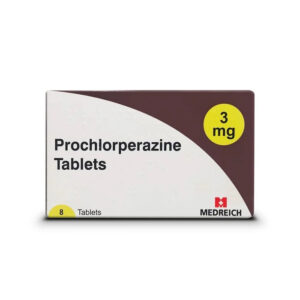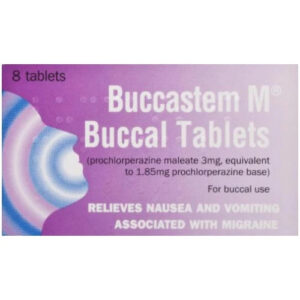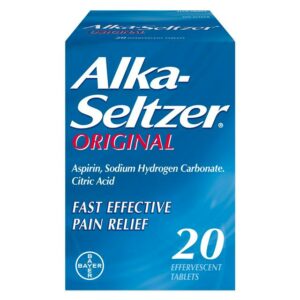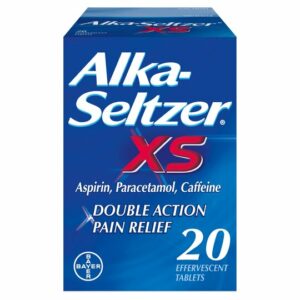Nausea Medication
Over-the-counter nausea medication is created to alleviate the discomfort caused by symptoms of nausea and vomiting, including those due to motion sickness, pregnancy, or various medical issues. Read More…

-

Prochlorperazine 3mg Buccal Tablets – 8 Tablets
- Each buccal tablet contains 3mg prochlorperazine maleate
- Effective treatment for vomiting and nausea
- Can also be used to treat migraine and dizziness
£6.09 Select options -

Buccastem M Buccal – 8 Tablets
- Active Ingredients: Prochlorperazine
- Relieves Nausea & Vomiting Associated with Migraine
- Buy With Confidence From UK Registered Pharmacy
£9.69 Select options -

Alka-Seltzer Original – 20 Tablets
- Fast & Effective Relief From Upset Stomach
- Buy With Confidence From UK Registered Pharmacy
- Next Day Delivery Available
£6.09 Add to basket -

Alka-Seltzer XS Tablets – 20 Tablets
- Symptomatic Relief Of Colds And Influenza
- Effective reduction Of High Temperature
- Treats Mild To Moderate Pain In The Body
£6.89 Add to basket -

Bloateze 50mg Tablets – 20 Tablets
- Effective relief of excess wind and stomach bloating
- Unique Simethicone - Charcoal formulation
- Begins to work in the stomach in 15 minutes
£7.49 Add to basket -

Windeze Gel Capsules
- Fast relief from the pain and discomfort of bloating & trapped wind
- Simeticone 125mg
- 20 soft gel capsules
£4.39 Add to basket -

Alka-Seltzer Original – 10 Tablets
- Fast effective pain relief
- 10 effervescent tablets
- Main ingredient: Aspirin
£3.29 Add to basket -

Original Andrews Salts 150g
- Fast & Effective Relief From Upset Stomach
- Buy With Confidence From UK Registered Pharmacy
- Next Day Delivery Available
£4.00 Read more -

FyboCalm Wind & Bloating Relief Capsules – 30 Capsules
- Helps prevent gut symptoms recurring
- Relieves wind, bloating and pain in two hours
- Forms a protective layer in the gut
£14.99 Add to basket
-
About Nausea
Nausea and vomiting are common symptoms that can be caused by a wide range of factors, from gastrointestinal issues to neurological triggers. Conditions that commonly result in nausea include peptic ulcers, gastritis, gastroparesis, motion sickness, early stages of pregnancy, intense pain, food poisoning, infections, and certain medications such as chemotherapy. These symptoms are a result of signals sent to the brain’s medullary vomiting centre, which can be influenced by factors affecting both the gastrointestinal tract and the central nervous system.
Vomiting, while often harmless, can occasionally indicate more serious conditions, such as concussions, encephalitis, meningitis, intestinal blockages, appendicitis, and brain tumours. Persistent or severe vomiting should be evaluated by a healthcare professional to rule out these and other significant medical concerns.
-
Symptoms
Nausea and vomiting are symptoms that can be triggered by various factors, including gastrointestinal disorders, central nervous system problems, and external influences like motion sickness or certain odours. Here’s a detailed look at common symptoms associated with nausea and vomiting:
• Feeling queasy or having an upset stomach, often described as a preliminary sensation that precedes vomiting.
• An urge to vomit (emesis), which is the act of expelling the contents of the stomach through the mouth.
• Increased saliva production, commonly occurring right before vomiting.
• Sweating or pale skin, which may accompany nausea especially right before vomiting.
• Abdominal pain or discomfort, often associated with the strain of vomiting.These symptoms can vary in intensity and duration, depending on the underlying cause. For instance, food poisoning might lead to sudden, intense symptoms, whereas morning sickness in pregnancy might cause prolonged periods of mild to moderate nausea.
It’s important to consult healthcare providers if nausea and vomiting persist, as they can lead to dehydration or indicate a more serious condition.
-
Diagnosis
Diagnosing nausea and vomiting generally involves a thorough evaluation by a healthcare provider to determine the underlying causes and appropriate treatment. The diagnostic process includes:
• Medical History: The doctor will ask detailed questions about the nausea and vomiting, including when they occur, how long they last, and any associated symptoms. This information helps to pinpoint potential triggers or underlying health conditions.
• Physical Examination: A comprehensive physical exam can help identify signs of conditions that might cause nausea and vomiting, such as abdominal swelling or pain.
• Lab Tests: Blood tests can check for signs of infection, dehydration, or other medical issues that might be causing the symptoms. Urine tests can help rule out pregnancy or kidney problems.
• Imaging Tests: Depending on the suspected cause, an X-ray, ultrasound, or CT scan may be used to view the stomach, intestines, and other structures in the abdomen.
• Endoscopy: For persistent nausea and vomiting, an endoscopy might be performed to directly view the upper digestive system.
• Specialised Tests: In cases where the cause remains unclear, more specialised tests might be conducted, such as gastric emptying studies to measure how quickly food leaves the stomach.Understanding the exact cause of nausea and vomiting is crucial to developing an effective treatment plan, which might include medications, dietary adjustments, or other therapies depending on the underlying condition.
-
Treatments
Over-the-counter medications can be very effective in managing nausea and vomiting. They work through various mechanisms to calm the stomach, block the signals that trigger the urge to vomit, or neutralise stomach acids that can cause discomfort. Here’s how the highlighted products can help:
Prochlorperazine 3mg Buccal Tablets: These tablets contain prochlorperazine maleate, which is effective in treating nausea and vomiting. They are placed in the buccal cavity, where they dissolve and work to block the nausea-triggering signals in the brain, and can also be used for migraines and dizziness.
Buccastem M Buccal – 8 Tablets: Containing the active ingredient prochlorperazine, these tablets are specifically formulated to relieve nausea and vomiting associated with migraines by dissolving in the buccal cavity for rapid absorption.
Alka-Seltzer Original – 20 Tablets: Alka-Seltzer provides fast relief from an upset stomach, which may include nausea and heartburn. It contains aspirin, sodium hydrogen carbonate (baking soda), and citric acid, which together help neutralise stomach acid.
Alka-Seltzer XS Tablets – 20 Tablets: These are a multi-symptom relief medication, not only addressing nausea and mild pain but also reducing fever and relieving the symptoms of colds and influenza.These medications are designed to provide symptom relief and are a convenient option for managing occasional nausea and vomiting.
-
Prevention Strategies
To prevent nausea and vomiting, consider these strategies:
• Opt for smaller, more frequent meals throughout the day.
• Eat slowly and choose easily digestible foods.
• Steer clear of very hot or cold foods to minimise nausea triggers.
• Post-meal, rest while keeping your head elevated.
• For morning nausea, have crackers before rising from bed.
• Stay hydrated, drinking fluids between meals.
• Delay tooth brushing right after meals if it induces nausea.
• If prone to motion sickness, face forward and focus on distant objects.
• Ensure good airflow and avoid activities like reading in a moving vehicle.
• Limit exposure to strong odours, and avoid spicy or fatty foods.Remember, these tips may reduce the likelihood of nausea and vomiting but might not prevent them in every situation, especially if due to medical conditions. Persistent issues should be discussed with a healthcare professional.












